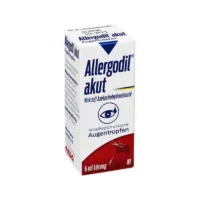Description
Rinomistin Nasal Drops Solution
Ingredients
Active ingredients: Xylometazoline 0.1% and Miramistin 0.01%. Other ingredients may include purified water, sodium dihydrogen phosphate dihydrate, disodium phosphate dodecahydrate, and benzalkonium chloride.
Dosage
For adults and children over 12 years:
- 1-2 drops into each nostril 2-3 times a day. Do not exceed the recommended dosage.
Indications
Rinomistin nasal drops are used to relieve nasal congestion caused by colds, allergies, or sinusitis. They work by reducing swelling of blood vessels in the nasal passages, facilitating easier breathing.
Contraindications
Avoid Rinomistin nasal drops if you:
- Are allergic to xylometazoline, miramistin, or any other ingredients.
- Have high blood pressure, heart disease, or diabetes without medical consultation.
- Are pregnant or breastfeeding without medical advice.
Directions
Usage: For nasal application only. Tilt your head back, insert the dropper into the nostril, and administer the specified number of drops. Repeat for the other nostril. Refrain from deep inhalation post-application.
Scientific Evidence
Studies have demonstrated the efficacy of Rinomistin nasal drops in alleviating nasal congestion. Xylometazoline, the active decongestant, narrows blood vessels in the nasal passages, diminishing swelling and congestion.
Additional Information
Adhere to the recommended dosage of Rinomistin nasal drops to prevent potential side effects like rebound congestion. Seek medical advice if symptoms persist or worsen. Always review the label and store the product appropriately. In case of adverse reactions, discontinue use and seek medical attention.



